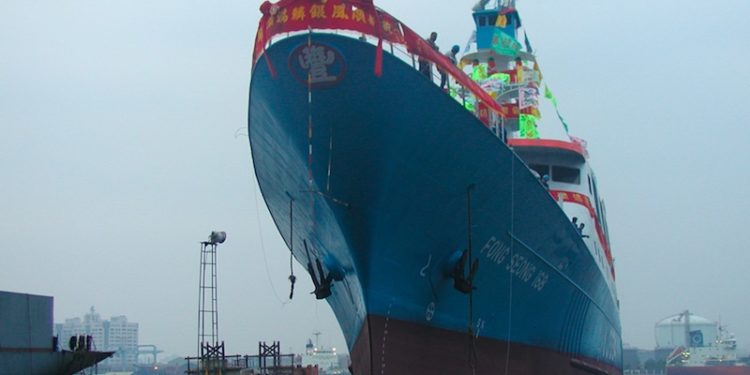According to the Taiwanese Fisheries Agency, the recent claims made by the Environmental Justice Foundation (EJF) regarding treatment of crews contain numerous inaccuracies, including that a number of the examples cited refer to vessels under other flags, over which Taiwan does not have jurisdiction.
The EJF film was released last week and paints a stark portrait of Taiwan’s fishing sector, to which the Taiwanese Fisheries Agency has responded by pointing out that there are currently 1140 authorised distant water vessels and 19,000 foreign crew are employed on these, with employment of foreign crew subject to authorisation.
According to the Fisheries Agency’s director general Kuo-Ping Lin, foreign crew members were provided with less protection in the past, but Taiwan has moved to rectify this with legislation passed earlier this year to guarantee that vessel operators abide by requirements for minimum wage levels, rest periods, holidays, travel costs and health insurance, as well as access to the relevant authorities in the event of a dispute.
Operators employing foreign crews are also required to guarantee a bond, so that in the event of a failure to meet these obligations, the Fisheries Agency is able to recover such costs.
He said that a hotline for crew to file complaints has been established and Agency personnel are actively involved in interviewing foreign crews on Taiwanese vessels, in both domestic and foreign ports, and added that any violation of the Human Trafficking Prevention Act, such cases will be referred to the judicial authorities for investigation.
‘Any domestic distant water fishing vessel or foreign fishing vessel operated by nationals engaging in illegal fishing operation is subject to severe penalties under the Distant Water Fisheries Act or the Act Governing Investment in the Operation of Foreign Flag Fishing Vessels,’ he said, commenting that the Fisheries Agency seeks to clarify misunderstandings in the EJF’s report and video.
‘In any labour disputes involving the foreign-flagged fishing vessels and the foreign crew members as referred to in EFJ’s report, it is an international practice that the principle of flag state jurisdiction should be respected,’ Kuo-Ping Lin said.
He commented that the shooting incident referred to in the EJF video refers to a vessel that was not under the Taiwanese flag, while the same applies to the issue of the foreign crewman on a vessel detained in Thailand not being paid.
‘As a Taiwanese national may be involved in this case, the Fisheries Agency has already submitted the relevant information to the Prosecutor’s Office,’ he said.
He said that with respect to the testimony referring to shark finning, Taiwan has enacted legislation and regulations requiring fins to remain naturally attached or alternatively to be tied to the corresponding carcass.
‘Since 2012, finning has been strictly prohibited,’ he said.
‘Taiwan has also sent inspectors to domestic and foreign ports to conduct landing inspection on Taiwanese vessels, and such inspections rarely identify any finning taking place on board Taiwanese vessels. Under the Distant Water Fisheries Act which entered into force on 20 January 2017, any operator violating this provision shall be subject to a fine no less than NTD$500,000 the fishing license may be suspended.’
‘The Fisheries Agency reiterates that it has implemented measures to safeguard the rights and benefits of foreign crew members employed overseas by Taiwanese distant water fishing vessels, and such measures will be reviewed accordingly, aimed at enhancing human rights and protection of foreign crew members,’ Kuo-Ping Lin said.









